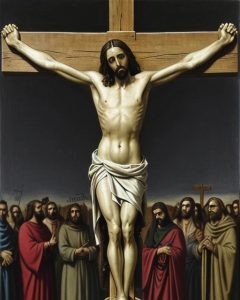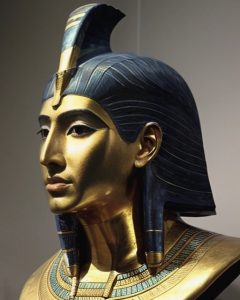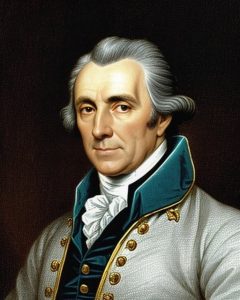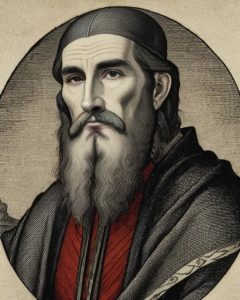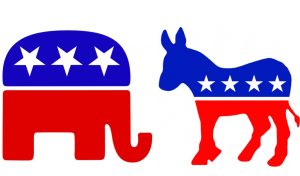Unraveling the Enigma of Warlocks: Tracing the Mystique of Male Practitioners of Dark Magic
Warlocks, shrouded in mystery and often feared for their mastery of the occult, have long captured the fascination of people across cultures and throughout time. In this article, we embark on a journey to unravel the complexities of the warlock, delving into their origins, depictions in myth and folklore, historical contexts, and modern interpretations. Through a multidisciplinary approach, we aim to shed light on the enduring allure of warlocks, exploring the blurred boundaries between myth and reality and the cultural significance of these enigmatic figures.
The term “warlock” is rooted in Old English and Old Norse words meaning “oathbreaker” or “deceiver.” In medieval Europe, warlocks were often portrayed as male witches who had broken their vows to serve a higher power. However, the concept of male practitioners of magic can be traced back to ancient legends and mythologies from various cultures.
Throughout history, warlocks have appeared in mythologies and folklores as powerful sorcerers, dark magicians, or agents of supernatural forces. In Norse mythology, figures like Loki and Grendel exhibit traits associated with warlocks, wielding magic for both good and evil purposes. Similarly, Celtic and Arthurian tales feature characters like Merlin, who blur the lines between wizardry and warlockry.
During the Middle Ages, the fear of witchcraft and sorcery led to the widespread persecution of individuals, primarily women, accused of practicing magic. While male witches were less commonly targeted, the concept of the warlock as a male wielder of dark magic persisted in the collective imagination. Historical accounts of alleged warlocks often reflect societal fears and anxieties surrounding power, gender roles, and religious beliefs.
In modern times, warlocks continue to inspire and captivate through literature, film, television, and gaming. From iconic literary figures like Faust to pop culture icons such as Harry Potter’s Severus Snape, modern depictions of warlocks reflect changing attitudes towards magic, morality, and the supernatural.
Despite their prevalence in myth and fiction, the existence of warlocks as practitioners of dark magic remains a topic of debate and skepticism. While some individuals may identify as warlocks within modern pagan or occult circles, the extent of their supernatural abilities and practices is subjective and often speculative.
In conclusion, warlocks represent a mesmerizing blend of myth, history, and imagination. Whether seen as mythical archetypes, relics of the past, or symbols of the present, the concept of the warlock continues to intrigue and captivate audiences worldwide. By exploring the rich tapestry of legends, beliefs, and representations surrounding warlocks, we gain insight into the human psyche and the enduring allure of the enigmatic and magical.
Good Friday: A Day of Reflection, Repentance, and Spiritual Contemplation
Good Friday is a significant day observed by Christians worldwide, commemorating the crucifixion and death of Jesus Christ. It falls on the Friday preceding Easter Sunday and holds immense religious and cultural importance. Good Friday is a somber and reflective day for Christians, as it marks the culmination of Jesus’ earthly journey and the ultimate sacrifice he made for humanity. It is a day of mourning, repentance, and deep contemplation. Christians remember the crucifixion with solemnity, acknowledging the immense suffering Jesus endured on the cross. The name “Good Friday” may seem paradoxical, considering the sorrowful nature of the day, but it is believed to have originated from the term “God’s Friday” or “Holy Friday.” Good Friday is a time for believers to reflect on their faith, seek forgiveness for their sins, and renew their commitment to following the teachings of Jesus. It is a day when churches hold special services, often characterized by prayers, hymns, readings from the Bible, and the reenactment of the Stations of the Cross. Many Christians also choose to observe fasting and abstain from meat or certain types of food on Good Friday as a sign of penance and solidarity with Jesus’ sacrifice. In some countries and cultures, Good Friday is a public holiday, providing individuals with the opportunity to attend religious services, spend time with family, or engage in acts of charity and compassion. Ultimately, Good Friday holds deep spiritual significance, reminding Christians of the immense love and grace offered through Jesus’ crucifixion and inviting them to reflect on their own lives, seek redemption, and strive for a closer relationship with God.
Orthogonal Frequency-Division Multiplexing (OFDM): A Key Enabler for Modern Communication Systems
Orthogonal Frequency-Division Multiplexing (OFDM) has emerged as a cornerstone technology in modern communication systems, enabling high-speed data transmission over wireless and wired channels. This article provides an in-depth exploration of OFDM, covering its fundamental principles, key components, applications, and advantages. By examining the underlying concepts and practical implementations of OFDM, this article aims to elucidate its critical role in meeting the increasing demand for high-capacity and reliable communication in diverse domains, including wireless networks, broadband access, digital broadcasting, and beyond.
Undoubtedly, OFDM has revolutionized data transmission in communication systems, introducing unparalleled spectral efficiency, resilience, and adaptability. Through a nuanced examination of OFDM’s significance in contemporary telecommunications, a profound understanding emerges.
By meticulously examining the foundational principles of OFDM, this narrative aims to demystify the operational mechanisms of this technology and elucidate why it excels in scenarios requiring high-speed data transmission. Concepts like subcarrier modulation, orthogonality, guard intervals, and the remarkable Fast Fourier Transform (FFT) are intricately explicated to offer a comprehensive comprehension of OFDM.
The discussion progresses to encompass the integral components of an OFDM system, including subcarrier modulation strategies, guard interval architecture, and synchronization methodologies. Additionally, a detailed investigation into the pivotal roles played by inverse and fast Fourier transforms (IFFT/FFT) in OFDM signal processing is meticulously presented.
The domain of OFDM extends across a broad spectrum of communication systems, encompassing ubiquitous wireless networks such as Wi-Fi, 4G LTE, and the cutting-edge 5G, digital broadcasting platforms like DAB and DVB, as well as broadband access avenues such as DSL and cable. This segment underscores the operational versatility and adaptability of OFDM in addressing diverse communication requirements.
OFDM emerges as a frontrunner by offering a multitude of advantages over traditional modulation techniques, exhibiting high spectral efficiency, resilience against channel distortions like multipath fading, and adaptability to dynamically evolving channel conditions. A detailed analysis of these advantages, along with an exploration of their implications on practical implementations, is provided.
While the prowess of OFDM in communication technology remains indisputable, challenges persist. Interference, synchronization issues, and the complexities of implementation pose significant obstacles to OFDM systems. The discourse shifts towards ongoing research endeavors and potential solutions aimed at overcoming these challenges. Furthermore, emerging trends and future trajectories in OFDM research are deliberated upon.
In the realm of telecommunications, Orthogonal Frequency-Division Multiplexing (OFDM) stands as a testament to the seamless integration of theory and practice. With its unparalleled efficiency, resilience, and flexibility, OFDM serves as a driving force behind innovation, shaping the landscape of communication systems at a global level.
Unveiling the Legacy of Menes: Egypt’s First Pharaoh
Menes, also known as Narmer, was the first pharaoh of the first dynasty in ancient Egypt. He is often credited with unifying Upper and Lower Egypt into one kingdom, thus establishing the Old Kingdom period in Egyptian history. Menes is a figure shrouded in mystery and legend, with many conflicting accounts of his life and reign. According to some sources, he was a powerful ruler who brought peace and prosperity to the land, while others depict him as a ruthless conqueror. Despite the discrepancies, one thing is certain – Menes played a crucial role in shaping the early civilization of Egypt.
Menes is believed to have been born around 3200 BC, during a time when Egypt was divided into two separate kingdoms – Upper Egypt in the south and Lower Egypt in the north. He was a member of the Thinite dynasty, which ruled over Upper Egypt. It is said that Menes inherited the throne from his father, although some sources claim that he overthrew the last king of Lower Egypt, thus gaining control over both regions. Whether through diplomacy or force, Menes succeeded in bringing the two kingdoms together and established his capital at the city of Memphis.
The unification of Egypt was a significant achievement, as it brought together different cultures, traditions, and languages. Menes is often depicted wearing the crown of Upper Egypt on one side of his head and the crown of Lower Egypt on the other, symbolizing his dual rule over the two kingdoms. This dual kingship would continue to be a tradition in ancient Egypt, with pharaohs often being depicted with two crowns.
Menes’ reign was marked by numerous accomplishments, including the construction of temples and monuments, the development of a centralized government, and the establishment of a writing system. He is also credited with introducing the concept of the divine right of the pharaoh, which held that the ruler was chosen by the gods and was the sole intermediary between them and the people. This belief would continue to shape Egyptian society for thousands of years.
Despite his many achievements, Menes’ reign was not without its challenges. He faced rebellions from various regions, and there were also conflicts with neighboring kingdoms. Some accounts even suggest that Menes was killed in a hippopotamus hunt, although the exact circumstances of his death remain a mystery.
Today, Menes is remembered as the first pharaoh and the founder of the Old Kingdom, a period of great prosperity and cultural advancement in ancient Egypt. His legacy lives on in the magnificent monuments and temples that still stand today, and his unification of Egypt remains a testament to his powerful leadership. Menes may be a figure of myth and legend, but his impact on Egyptian history cannot be denied.
Leveraging Artificial Intelligence for User and Entity Behavior Analytics (UEBA)
User and Entity Behavior Analytics (UEBA) has emerged as a vital component in the ever-changing cybersecurity landscape, empowering organizations to swiftly detect and counter anomalous activities. In a world where cyber threats are growing in complexity and volume, traditional methods of monitoring and analyzing user behavior fall short. However, this paper delves into the integration of Artificial Intelligence (AI) techniques into UEBA, revolutionizing the ability to identify and neutralize security threats in real-time. The fusion of UEBA and AI presents an exciting avenue for organizations to fortify their cybersecurity defenses and proactively confront emerging threats head-on.
In today’s digital landscape, cybersecurity threats are becoming increasingly sophisticated, necessitating the adoption of advanced analytics solutions. UEBA focuses on scrutinizing and understanding user and entity behavior within a network, allowing it to identify any deviations from normal patterns that may indicate potential security threats.
Motivation:
The traditional approaches to UEBA often struggle to keep pace with the rapidly evolving threat landscape. However, AI, with its remarkable capability to process vast amounts of data and discern intricate patterns, holds immense potential to enhance UEBA capabilities, offering more precise threat detection and response.
AI in UEBA:
Machine Learning Algorithms:
UEBA can leverage machine learning algorithms, such as supervised and unsupervised learning, to model normal behavior and uncover anomalies. Supervised learning allows the system to learn from labeled data, while unsupervised learning identifies patterns without prior training.
Deep Learning:
Deep learning techniques, particularly neural networks, prove invaluable in analyzing complex relationships within user and entity behavior data. By employing neural networks, UEBA can uncover hidden patterns and anomalies, providing a deeper level of insight into potential threats.
Natural Language Processing (NLP):
The integration of NLP elevates UEBA by enabling the analysis of unstructured data, such as text logs and communication transcripts. NLP empowers the system to understand the context and sentiment of user interactions, contributing to a more comprehensive understanding of behavior patterns.
Benefits of AI-Driven UEBA:
Improved Accuracy:
The integration of AI into UEBA significantly enhances the accuracy of threat detection by minimizing false positives and negatives. Machine learning models continually adapt to new data, ensuring the system remains effective against evolving threats.
Real-time Threat Detection:
AI-driven UEBA empowers organizations to swiftly detect and respond to security incidents in real-time, minimizing the impact of potential breaches. The rapid analysis of user and entity behavior guarantees timely mitigation measures.
Scalability:
AI facilitates the scalability of UEBA solutions, empowering organizations to efficiently handle large volumes of data. As data sources and network complexity continue to grow, AI-driven UEBA seamlessly adapts, providing robust cybersecurity capabilities.
Challenges and Considerations:
Data Privacy and Ethics:
The deployment of AI in UEBA necessitates careful consideration of data privacy and ethical concerns. Organizations must implement measures to ensure the responsible use of AI while safeguarding user privacy.
Training Data Quality:
The effectiveness of AI models in UEBA hinges on the quality of training data. It is crucial to ensure diverse, representative, and up-to-date datasets to avoid biased models and inaccurate threat assessments.
Future Directions:
Explainable AI:
Enhancing the interpretability of AI models in UEBA is vital to foster trust and comprehension of the decision-making process. Explainable AI techniques will play a fundamental role in making UEBA more transparent and accountable.
Fusion of AI Technologies:
The fusion of various AI technologies, encompassing machine learning, deep learning, and natural language processing, will contribute to a more holistic and robust UEBA framework. Integration with other cybersecurity solutions will further fortify the overall security posture.
The integration of AI into UEBA represents a significant advancement in cybersecurity, equipping organizations with the necessary tools to effectively detect and respond to evolving threats. As AI technologies continue to mature, the synergy between AI and UEBA will play a pivotal role in shaping the future of cybersecurity, offering resilient and adaptive defense mechanisms against a dynamic threat landscape. Organizations must embrace this convergence to remain one step ahead of cyber adversaries and protect their digital assets.
Exploring the Health Effects of Vaping: A Comprehensive Review
Vaping, the act of inhaling and exhaling aerosol produced by an electronic cigarette or similar device, has emerged as a popular alternative to traditional tobacco smoking. While proponents argue for its potential harm reduction in comparison to smoking, concerns have been raised regarding its health effects. This article aims to provide a comprehensive review of the current scientific literature on the health effects of vaping, covering respiratory, cardiovascular, and other potential health impacts. It also examines the role of vaping in smoking cessation and regulatory considerations. Through an examination of available evidence, this paper aims to contribute to a better understanding of the health implications associated with vaping.
Vaping, the use of electronic cigarettes (e-cigarettes) or similar devices, has gained widespread popularity in recent years. Initially marketed as a smoking cessation aid, vaping has become a cultural phenomenon, particularly among youth and young adults. However, concerns have been raised about the health effects of vaping, prompting extensive research to evaluate its safety and potential risks.
One of the primary concerns regarding vaping is its impact on respiratory health. Studies have shown that vaping can lead to irritation of the airways, increased airway resistance, and inflammation. Inhalation of aerosols produced by vaping devices exposes users to various chemicals, including nicotine, flavorings, and potentially harmful compounds such as formaldehyde and acrolein. Chronic exposure to these substances may contribute to respiratory symptoms such as coughing, wheezing, and shortness of breath. Furthermore, there is evidence suggesting that vaping may increase the risk of respiratory infections and exacerbate pre-existing lung conditions.
In addition to respiratory effects, vaping has been linked to cardiovascular health risks. Nicotine, a highly addictive substance present in most e-cigarettes, can elevate heart rate and blood pressure, increasing the workload on the heart. Chronic nicotine exposure may also contribute to the development of cardiovascular diseases such as hypertension and atherosclerosis. Furthermore, some studies have suggested that certain flavoring agents used in e-cigarettes may have adverse effects on vascular function, although further research is needed to elucidate these potential risks.
Beyond respiratory and cardiovascular effects, vaping has been associated with a range of other health concerns. These include oral health problems such as gum irritation and inflammation, as well as potential adverse effects on reproductive health and fetal development in pregnant women. Moreover, there are concerns about the long-term effects of inhaling aerosolized chemicals and the potential for vaping to serve as a gateway to tobacco use among non-smokers, particularly adolescents.
Despite the health risks associated with vaping, some argue that it may serve as a less harmful alternative to traditional smoking, potentially aiding in smoking cessation efforts. Research suggests that vaping may be more effective than traditional nicotine replacement therapies in helping smokers quit. However, the evidence is mixed, and there are concerns that vaping may perpetuate nicotine addiction and serve as a gateway to tobacco use rather than a cessation aid.
Given the growing popularity of vaping and the emerging evidence of its health effects, regulatory agencies face the challenge of balancing public health concerns with the potential benefits of harm reduction. Several countries have implemented regulations to restrict the sale and marketing of vaping products, particularly to minors, and to regulate product labeling and quality standards. However, the regulatory landscape remains complex, with ongoing debates about how best to regulate vaping to protect public health while ensuring access for adult smokers seeking cessation aids.
In conclusion, vaping represents a complex and multifaceted issue with implications for public health, regulation, and tobacco control policy. While some evidence suggests that vaping may offer harm reduction potential for smokers, concerns about its health effects, particularly among youth and non-smokers, cannot be overlooked. Further research is needed to better understand the long-term health effects of vaping and to inform evidence-based policies aimed at reducing harm and promoting public health.
Ethical and Legal Implications of Social Media Monitoring in Employment Termination
This paper explores the contentious issue of whether employers should have the authority to terminate employment based on employees’ social media posts. In the digital age, social media has become an integral part of our lives, blurring the boundaries between personal and professional spheres. However, the implications of employers monitoring and acting upon employees’ social media activity raise ethical, legal, and privacy concerns. Through an analysis of relevant literature, case studies, and ethical frameworks, this paper aims to provide insights into the complexities surrounding this issue and proposes considerations for balancing employer interests with employee rights.
In recent years, the proliferation of social media platforms has transformed the way individuals interact, communicate, and express themselves. However, this unprecedented level of connectivity has also given rise to new challenges, particularly in the realm of employment. Employers increasingly turn to social media to screen potential candidates and monitor the activities of current employees. While this practice may be motivated by legitimate concerns such as protecting company reputation and safeguarding against misconduct, it raises fundamental questions about privacy, freedom of expression, and the power dynamics within the employer-employee relationship.
The ethical implications of employers monitoring social media activity extend beyond the realm of privacy rights. Employers’ actions can have far-reaching consequences on individuals’ personal and professional lives. Employees may feel pressured to self-censor or conform to certain norms, stifling their freedom of expression and individuality. Moreover, the subjective interpretation of social media posts may lead to unjust discrimination based on factors such as race, gender, or political beliefs. Employers must consider the broader ethical implications of their actions and strive to uphold principles of fairness, respect, and dignity in the workplace.
From a legal standpoint, the legality of employers terminating employment based on social media posts varies depending on jurisdiction and specific circumstances. While employees in some jurisdictions may be protected by laws prohibiting discrimination or protecting freedom of speech, others may have limited legal recourse. Furthermore, the evolving nature of social media and digital communication presents challenges in interpreting existing legal frameworks. Courts are tasked with balancing employers’ legitimate interests with employees’ rights to privacy and freedom of expression, often leading to complex and context-specific rulings.
Several high-profile cases have shed light on the complexities of social media monitoring in employment termination. In some instances, employees have been dismissed for posting controversial or offensive content online, leading to public outcry and debates over the limits of employer authority. Conversely, employees have successfully challenged their terminations on grounds of unfair dismissal or violation of privacy rights. These case studies underscore the need for clear guidelines and safeguards to govern the use of social media in employment decisions.
To address the ethical and legal challenges associated with social media monitoring, employers should adopt transparent policies that clearly outline acceptable and unacceptable conduct online. These policies should strike a balance between protecting company interests and respecting employees’ rights to privacy and freedom of expression. Additionally, employers should provide training and education to employees on the implications of social media use in the workplace and the potential consequences of inappropriate behavior. Finally, regulatory bodies should continue to monitor developments in this area and update relevant legislation to ensure adequate protection for all parties involved.
The issue of whether employers should be allowed to terminate employment based on social media posts is complex and multifaceted. While employers have a legitimate interest in protecting their reputation and ensuring a safe and respectful work environment, employees’ rights to privacy and freedom of expression must also be upheld. By adopting clear policies, providing education and training, and adhering to legal and ethical principles, employers can navigate this issue responsibly and ethically. Ultimately, striking the right balance between competing interests is essential to fostering a workplace environment that promotes integrity, fairness, and mutual respect.
Echoes of Freedom: The Enduring Legacy of Patrick Henry’s Call to Arms
“Give me liberty or give me death” reverberates as a resounding declaration credited to Patrick Henry, a true luminary among the founding fathers of the United States. These words, etched in history, emanated from the depths of his soul during a momentous speech at the Second Virginia Convention on March 23, 1775. In that electric atmosphere, Henry’s call to arms reverberated, urging his fellow delegates to seize the moment and confront the shackles of British tyranny head-on.
With unparalleled eloquence and an unquenchable fire within, Henry painted a vivid picture of the colonists’ struggle, emphasizing that all peaceful avenues for resolution had been exhausted. The time had come to rise up, to shed blood and sweat for the cherished ideals of freedom. The crowd was spellbound, gripped by the essence of Henry’s words, encapsulating the very spirit that fueled the flames of the American Revolution—the unwavering thirst for liberty, unyielding in the face of any sacrifice.
From that moment forward, the phrase “Give me liberty or give me death” has transcended the boundaries of time, becoming an anthem for those who champion the preservation and defense of their rights and freedoms. It serves as a poignant reminder of the profound sacrifices borne by the early patriots, etching the indelible importance of individual liberty into the very fabric of our nation.
Patrick Henry’s impassioned plea, resonating through the annals of history, continues to ignite the hearts and minds of generations. It impels them to stand firm in the face of adversity, to rise up and fight unwaveringly for the principles they hold dear. For in those immortal words, we find the embodiment of courage, the embodiment of the unwavering pursuit of what is right and just.
Cultivating Sunshine: A Comprehensive Guide to Growing Sunflowers
Sunflowers are known for their stunning blooms and impressive height, making them a beloved symbol of summer and a must-have for any garden. This paper serves as a comprehensive guide to growing sunflowers, covering all the necessary steps from preparing the soil to harvesting the seeds, and offering valuable tips for optimal care and growth.
Helianthus annuus, more commonly known as sunflowers, are not only visually appealing but also have many practical uses. From adding a pop of color to your garden to providing nutritious seeds for snacking or bird feed, mastering the art of growing sunflowers can lead to a fruitful and fulfilling experience. This paper aims to equip both beginners and experienced gardeners with the knowledge and techniques needed to successfully cultivate these versatile plants.
Before getting your hands dirty, it’s crucial to select the right sunflower variety based on your preferences and intended use. With options ranging in size, color, and seed characteristics, you can choose from ornamental varieties for display, cut flowers, or seed production. Popular choices include ‘Giant Russian’, ‘Mammoth’, ‘Autumn Beauty’, and ‘Lemon Queen’, each offering unique features and growth habits.
Sunflowers thrive in well-drained, fertile soil with ample sunlight. Begin by choosing a sunny location with at least six to eight hours of direct sunlight per day. Loosen the soil to a depth of 12 to 18 inches and enrich it with organic matter, such as compost or aged manure, to improve its fertility and drainage. Avoid planting in compacted or waterlogged soil, which can hinder root growth and lead to unhealthy plants.
Sunflowers are typically grown from seeds, which can be sown directly into the ground after the threat of frost has passed. Plant the seeds 1 to 1.5 inches deep and space them 6 to 12 inches apart, depending on the variety’s mature size. After planting, water the soil thoroughly to ensure good seed-to-soil contact and encourage germination. For larger varieties, providing support, like stakes or trellises, can prevent the plants from toppling over in windy conditions.
Caring for Sunflowers:
Once your sunflowers have sprouted, proper care is essential for their growth and blooming. Here are some key tips:
Sunflowers need regular watering, especially during dry periods, to promote healthy growth and flowering. Water deeply at the base of the plants and avoid wetting the leaves to prevent fungal diseases. When the seedlings have established their second set of leaves, apply a balanced fertilizer, such as a 10-10-10 or 5-10-5 formulation. Follow the instructions on the package for the correct application rate and avoid over-fertilizing, which can lead to excessive foliage growth at the expense of flowers. Keep the area around your sunflowers free of weeds, which compete for nutrients, water, and sunlight. Mulching with organic materials, like straw or shredded leaves, can help suppress weeds and retain soil moisture. Monitor your sunflowers for common pests, such as aphids, caterpillars, and birds, and take appropriate measures to control infestations. Additionally, regularly check the plants for signs of diseases, such as powdery mildew or downy mildew, and promptly remove and dispose of any affected parts to prevent spread. The harvest is the most rewarding part of growing sunflowers. Wait until the back of the sunflower heads turns yellow or brown and the seeds develop a hard shell. Cut the flower heads, leaving a few inches of stem attached, and hang them upside down in a warm, dry place to dry for 1-2 weeks. Once dry, remove the seeds by rubbing or shaking the heads, and store them in a cool, dry place in airtight containers for later use.
Growing sunflowers is a fulfilling experience that rewards gardeners with stunning blooms, nutritious seeds, and a sense of accomplishment. By following the guidelines outlined in this paper, you can cultivate healthy sunflower plants from seed to harvest, creating beautiful displays and enjoying the benefits of homegrown produce. Whether you’re looking to add some beauty to your garden, use the seeds for cooking, or attract wildlife, sunflowers are sure to bring joy and brighten up any space.
Harnessing Solar Power: A Homeowner’s Guide to Cost Offset and Sustainability
As the world embraces sustainable energy solutions, homeowners are increasingly turning to solar power to offset costs and reduce their carbon footprint. This paper explores the benefits of solar energy for homeowners, discussing the installation process, financial considerations, and strategies to maximize cost offset while contributing to a greener future.
Solar power offers homeowners a renewable energy source that can significantly reduce electricity bills and lessen dependence on fossil fuels. With advancements in technology and government incentives, installing solar panels has become more accessible and financially viable for homeowners. This paper aims to provide a comprehensive guide for homeowners looking to harness solar power to offset costs and promote sustainability.
One of the primary benefits of solar power is its potential for significant cost savings on electricity bills. By generating electricity from sunlight, homeowners can reduce or eliminate their reliance on grid electricity, thus lowering their monthly utility expenses. Solar power is a clean, renewable energy source that produces minimal greenhouse gas emissions compared to traditional fossil fuels. By utilizing solar energy, homeowners can reduce their carbon footprint and contribute to mitigating climate change. Solar power provides homeowners with greater energy independence by generating electricity on-site. This reduces vulnerability to fluctuations in utility prices and disruptions in the power grid, enhancing resilience during emergencies. Homes equipped with solar panels typically command higher property values and sell faster than those without. Solar installations are viewed as valuable assets that offer long-term cost savings and environmental benefits, making properties more attractive to potential buyers.
A professional solar installer conducts a site assessment to evaluate the suitability of the property for solar panel installation. Factors such as roof orientation, shading, and structural integrity are assessed to determine the optimal placement of solar panels. Once the site assessment is complete, the solar installer designs a customized solar energy system tailored to the homeowner’s energy needs and site conditions. The design is submitted for permitting approval from the local authorities before installation can proceed. The solar panels, inverters, and mounting hardware are installed on the homeowner’s property according to the approved design. This typically involves securing the panels to the roof or ground-mounted racks and connecting them to the electrical system. After installation, the solar system is interconnected with the utility grid through a net metering agreement. This allows excess electricity generated by the solar panels to be fed back into the grid for credits, which can be used to offset future electricity bills.
The upfront costs of installing a solar energy system vary depending on factors such as system size, equipment quality, and installation complexity. However, homeowners can recoup their investment through long-term energy savings and potential incentives. Government incentives, such as the federal investment tax credit (ITC) and state-specific rebates, can significantly reduce the cost of installing solar panels. Homeowners should research available incentives and consult with a tax professional to maximize savings.
Financing Options: Many solar installers offer financing options, such as solar loans and leases, to help homeowners finance their solar installations with little to no upfront costs. These financing options allow homeowners to pay for their solar systems over time while still enjoying immediate cost savings on electricity bills.
Return on Investment (ROI): Calculating the ROI of a solar energy system involves considering factors such as upfront costs, energy savings, incentives, and system longevity. Despite the initial investment, solar power offers homeowners a favorable ROI over the lifespan of the system, typically ranging from 5 to 20 years depending on various factors.
Properly sizing the solar energy system to match the homeowner’s energy needs is crucial for maximizing cost offset. An oversized system may generate excess electricity that goes unused, while an undersized system may not fully meet the homeowner’s energy demands. Implementing energy efficiency measures, such as installing LED lighting, upgrading appliances, and improving insulation, can complement solar power and further reduce electricity consumption. By minimizing energy waste, homeowners can maximize the cost offset provided by their solar installations. Some utility companies offer TOU billing plans that incentivize homeowners to shift energy consumption to off-peak hours when electricity rates are lower. By aligning energy usage with solar generation patterns, homeowners can optimize cost savings and maximize the value of their solar energy systems. Adding battery storage to a solar energy system allows homeowners to store excess electricity generated during the day for use during periods of low solar production or grid outages. Battery storage systems enhance energy independence and resilience while further reducing reliance on grid electricity.
Harnessing solar power offers homeowners a sustainable and cost-effective solution to offset electricity costs while reducing their environmental impact. By understanding the benefits of solar energy, navigating the installation process, considering financial implications, and implementing strategies to maximize cost offset, homeowners can enjoy the long-term rewards of clean, renewable energy generation. Embracing solar power not only makes economic sense but also contributes to a greener, more sustainable future for generations to come.
Exploring the Enchantment: Unveiling Polynesia’s Rich Cultural Tapestry
Imagine a vast expanse of crystal clear waters, dotted with over 1,000 stunning islands stretching across 15 million square kilometers in the Pacific Ocean. This is Polynesia, a region steeped in tropical beauty and rich cultural heritage. The name itself, derived from the Greek words “poly” meaning many, and “nesos” meaning islands, perfectly captures the essence of this breathtaking destination. It is made up of three distinct groups of islands – Melanesia, Micronesia, and Polynesia – each with their own unique charm and traditions, yet connected by a shared history and cultural ties.
The islands of Polynesia are a haven for nature lovers, with lush rainforests, pristine beaches, and a diverse range of flora and fauna, including many endemic species found nowhere else in the world. But it’s not just the natural beauty that draws visitors to these islands. The people of Polynesia, with their diverse mix of Polynesian, Asian, and European influences, have a deep connection to their land and sea. Their traditional way of life revolves around fishing, farming, and navigation, and their culture is steeped in oral traditions, with storytelling, music, and dance playing a significant role in their society.
One of the most iconic symbols of Polynesia is the outrigger canoe, which has been used for thousands of years for transportation, fishing, and exploration. It is a testament to the early Polynesians’ incredible navigational skills, as they used their knowledge of the stars, winds, and ocean currents to explore and settle new islands. Today, this same spirit of exploration and adventure continues to attract visitors from all over the world to Polynesia.
With a rich history dating back over 3,000 years, Polynesia is a place where ancient traditions and modern influences coexist. It is a popular tourist destination, offering a unique blend of natural wonders, vibrant culture, and warm hospitality. From the stunning landscapes to the warm and welcoming people, there is no shortage of reasons to visit and explore this enchanting region. In conclusion, Polynesia is a true paradise, with its diverse islands, cultures, and traditions waiting to be discovered and experienced.
Countries and territories comprising Polynesia: Samoa, Tonga, Tuvalu, Cook Islands, French Polynesia (includes Tahiti), Niue, American Samoa, Tokelau, Wallis and Futuna, Easter Island (a special territory of Chile).
Transforming Cybersecurity: The Role of AI in Vulnerability Management
As the digital landscape continues to expand, organizations find themselves under an ever-increasing barrage of cyber threats. In the face of this challenge, the integration of Artificial Intelligence (AI) in Vulnerability Management has emerged as a critical strategy to bolster cybersecurity defenses. Prepare to embark on a journey through the transformative impact of AI in identifying, prioritizing, and mitigating vulnerabilities, offering a proactive approach to managing cyber risks.
Vulnerability management stands as a cornerstone of cybersecurity, where its effectiveness becomes paramount in safeguarding organizations against potential exploits. With IT ecosystems growing more complex and cyber threats becoming ever more dynamic, advanced solutions become a necessity. Brace yourself as we explore how AI, armed with its analytical prowess, reshapes vulnerability management practices to enhance resilience against an ever-evolving threat landscape.
Enter the realm of AI-powered automated scanning tools, revolutionizing the identification of vulnerabilities within networks. These tools autonomously scan colossal datasets, employing AI algorithms to pinpoint potential weaknesses before they can be exploited by malicious adversaries. This automation not only accelerates the detection process but also ensures a comprehensive and continuous assessment of an organization’s security posture.
Now, let us journey through the challenge of prioritizing risks in vulnerability management. AI algorithms, with their data-driven approach, bring forth a solution. They assess the severity of vulnerabilities based on potential impact and exploit feasibility, guiding organizations to direct their resources toward addressing the most critical vulnerabilities first. This optimization of the overall risk mitigation strategy becomes the key to success.
Behold the adaptive learning capabilities of AI systems in vulnerability management! They continuously evolve by learning from historical data, enabling them to stay ahead of emerging threats and new attack vectors. This adaptive learning ensures that vulnerability management tools remain effective in the face of rapidly evolving cyber threats.
But wait, there’s more! AI enhances vulnerability management by providing real-time threat intelligence. By meticulously analyzing global threat data and correlating it with an organization’s specific vulnerabilities, AI systems offer deep insights into emerging threats that may impact the organization. This proactive approach empowers organizations to take timely mitigation measures, strengthening their overall cyber resilience.
Witness the seamless integration of AI with incident response processes within vulnerability management. In the event of a security incident, AI steps in to automate the correlation of vulnerabilities with ongoing threats, enabling a more rapid and effective response. This integration ensures a cohesive and synchronized approach to managing cyber threats, leaving adversaries with no room to maneuver.
AI contributes to a significant reduction in false positives in vulnerability assessments, thanks to its refined analysis techniques and contextual information processing. With enhanced accuracy in identifying genuine security risks, cybersecurity teams can allocate their resources more efficiently, focusing on addressing actual vulnerabilities rather than chasing shadows.
Traditional vulnerability management approaches often involve periodic assessments, but AI changes the game. It enables continuous monitoring of the network, ensuring that vulnerabilities are identified and addressed in real-time. This adaptability effectively reduces the window of opportunity for attackers to exploit weaknesses, leaving them frustrated and powerless.
As we gaze into the future, we must acknowledge the challenges that lie ahead. While AI continues to advance in vulnerability management, questions of interpretability, ethical considerations, and the potential for adversarial attacks on AI models must be addressed. Research into explainable AI is crucial for better understanding AI-driven vulnerability assessments, and the development of standardized practices for ethical and responsible AI usage in cybersecurity is imperative.
The integration of AI in vulnerability management represents a paradigm shift in cybersecurity practices. By automating scanning, prioritizing risks, and providing real-time threat intelligence, AI empowers organizations to proactively manage vulnerabilities. This paper serves as a testament to the transformative potential of AI in fortifying cybersecurity defenses and advocates for the continuous evolution of vulnerability management strategies in response to the dynamic nature of cyber threats.
Changing Cultural Attitudes: Implications for Religious Institutions
Shifting cultural attitudes towards religion and spirituality, marked by increasing secularization and skepticism towards organized religion, have significantly impacted engagement with religious institutions and trust in their teachings and authority. This article explores the dynamics of changing cultural attitudes and their implications for religious institutions. By examining the factors driving secularization and skepticism, as well as potential responses from religious organizations, this paper aims to shed light on the challenges facing religious institutions in an evolving cultural landscape.
Religious institutions have long played a central role in shaping individual beliefs, moral values, and social norms. However, in recent years, changing cultural attitudes towards religion and spirituality have challenged the traditional authority and influence of organized religion. This paper examines the implications of shifting cultural attitudes for religious institutions, including decreased engagement and trust in their teachings.
One of the key trends shaping cultural attitudes towards religion is secularization, characterized by the declining influence of religious beliefs and practices in public and private life. As societies become increasingly modernized and diversified, traditional religious beliefs and institutions face competition from secular worldviews and alternative sources of meaning and identity. This trend is further compounded by skepticism towards organized religion, fueled by concerns about dogma, hypocrisy, and institutional abuse.
As secularization and skepticism towards organized religion grow, there has been a corresponding decline in engagement with religious institutions. Attendance at religious services, affiliation with organized religious denominations, and participation in religious rituals and practices have all seen notable decreases in recent years. This trend is particularly pronounced among younger generations, who are more likely to identify as religiously unaffiliated or “nones.”
Alongside decreased engagement, there has been a parallel decline in trust in the teachings and authority of religious institutions. Scandals, controversies, and perceived inconsistencies between religious teachings and lived experiences have eroded confidence in organized religion as a source of moral guidance and spiritual authority. As a result, individuals are increasingly turning to alternative sources of meaning, such as personal spirituality, mindfulness practices, and secular ethics.
In response to these challenges, some religious institutions are adapting their approaches to better resonate with contemporary cultural attitudes. This may involve emphasizing social justice and community service, fostering interfaith dialogue and cooperation, and embracing new forms of worship and outreach. Additionally, efforts to address internal issues such as transparency, accountability, and inclusivity can help rebuild trust and credibility.
Changing cultural attitudes towards religion and spirituality, characterized by increasing secularization and skepticism towards organized religion, present significant challenges for religious institutions. Decreased engagement and trust in religious teachings and authority underscore the need for adaptation and innovation within these institutions. By understanding the dynamics of shifting cultural attitudes and responding proactively, religious organizations can navigate the complexities of an evolving cultural landscape while continuing to fulfill their mission of serving believers and communities.
Embracing the Spirit of Saint Patrick: A Global Celebration of Irish Heritage
Get ready to don your green attire and join in on the global celebration of St. Patrick’s Day! This cultural and religious holiday, held every year on March 17th, pays tribute to the patron saint of Ireland, Saint Patrick, and the rich Irish heritage. What began as a religious feast day in Ireland has now evolved into a worldwide festivity, highlighting the country’s culture, traditions, and identity.
Saint Patrick, a British native, was captured by Irish raiders as a teenager and brought to Ireland as a slave. Despite his hardships, he found solace in Christianity and eventually escaped back to Britain. However, his calling to spread the Christian faith among the pagan Irish led him back to Ireland as a missionary.
Legend has it that Saint Patrick used the three-leafed shamrock, a native Irish plant, to explain the concept of the Holy Trinity to the Irish people. He also famously drove out all the snakes from Ireland, symbolizing his efforts to eradicate pagan beliefs.
Initially, St. Patrick’s Day was a religious observance, marking the anniversary of Saint Patrick’s death in the 17th century. It was a day filled with religious services and feasting. However, as the holiday gained popularity, it became more secularized, especially among the Irish diaspora in countries like the United States, Canada, and Australia.
Irish immigrants brought their St. Patrick’s Day traditions with them wherever they settled, and over time, the holiday transformed into a celebration of Irish culture and identity. Today, parades, traditional Irish music and dance, and the consumption of Irish food and drink are all part of the festivities. It’s a day for all to revel in the spirit of the global Irish community and honor the enduring legacy of Saint Patrick.
Guardians of Justice: The Legacy of the FBI in Safeguarding America
The FBI, short for the Federal Bureau of Investigation, is an iconic national law enforcement agency in the United States. Established in 1908 under the guidance of Attorney General Charles Bonaparte, this agency was founded with the noble objective of consolidating investigations for the Department of Justice. Over time, the FBI has expanded in both authority and reputation, evolving into a prominent pillar of governance throughout the nation.
Endowed with a multitude of responsibilities, the FBI carries the weighty burden of investigating a wide array of federal offenses, spanning from the threat of terrorism to the realm of cybercrime, organized crime, and violations against civil rights. Collaborating with various law enforcement agencies at all levels, the FBI stands as a crucial force in the constant fight against crime and at the forefront of enhancing national security.
Nevertheless, the agency’s jurisdiction goes beyond mere crime resolution. Equipped with specialized units like the Hostage Rescue Team, the Critical Incident Response Group, and the Behavioral Analysis Unit, the FBI remains ever-prepared to navigate high-stakes challenges and provide assistance to their colleagues in law enforcement. Exemplifying the values of integrity and justice are the iconic FBI agents, who wear their distinctive blue jackets and emblematic badges with ceremonial pride.
Furthermore, the FBI’s influence extends to intelligence gathering and thwarting foreign intelligence activities that threaten the safety of the United States. Rooted in a tapestry of history intertwined with complexity, the FBI progresses alongside technological advancements and the evolving nature of criminal enterprises.
As the steadfast guardians of the nation, the FBI leaves an enduring mark on the landscape of law and order that transcends the ordinary. Their contributions serve as a stronghold of defense, guaranteeing that the cherished grounds of America remain safeguarded within the realms of safety and security, thereby upholding the sanctity of the American way of life.
The Silk Road: A Pathway of Exchange and Cultural Encounter
The Silk Road, an expansive network of trade routes spanning Asia, holds immense historical significance. It acted as a conduit for cultural exchange, commercial activities, and intellectual discussions between the East and the West. This paper delves into the intricate nature of the Silk Road, exploring its origins, routes, and lasting impact on global civilizations. From the bustling markets of Xi’an to the vibrant bazaars of Constantinople, the Silk Road facilitated the exchange of goods, ideas, and beliefs, shaping the interconnected world we live in today.
As a symbol of human ingenuity and determination, the Silk Road connected distant civilizations through a complex web of trade routes. Beginning in ancient China, this intricate network of paths traversed vast landscapes of deserts, mountains, and plains, linking the East to the Mediterranean region. Over time, the Silk Road evolved into a hub of cultural interchange, fostering the spread of knowledge, technology, and religious practices.
The origins of the Silk Road can be traced back to the Han Dynasty of China (206 BCE – 220 CE) when Emperor Wu Di sought to establish diplomatic and trade relations with Central Asian kingdoms. Initially centered around silk, a prized commodity in the West, trade on the Silk Road expanded to include spices, precious metals, gemstones, textiles, and exotic goods from various parts of Asia.
The Silk Road encompassed several main routes, each presenting its own challenges and opportunities. The northern route crossed the harsh terrains of Central Asia, connecting China to Persia, Central Asia, and the Roman Empire. The central route passed through the Taklamakan Desert, linking China to the lush oasis cities of Samarkand and Bukhara. Concurrently, the southern route extended through the Indian subcontinent, facilitating sea trade between China, India, and the Arabian Peninsula. Key cities such as Xi’an, Kashgar, Samarkand, and Constantinople emerged as vibrant hubs of trade and cultural fusion along the Silk Road.
Beyond the exchange of goods, the Silk Road served as a conduit for the transmission of ideas, beliefs, and artistic influences. Buddhism spread from India along the Silk Road to China and beyond, leaving its mark on art, architecture, and philosophy. Islamic civilization thrived in the commercial centers of Central Asia, blending elements from Persian, Indian, and Chinese cultures to create a diverse cultural tapestry. The Silk Road also facilitated the sharing of scientific knowledge, including advancements in astronomy, mathematics, and medicine.
The decline of the Silk Road can be attributed to various factors such as the rise of maritime trade routes, political unrest, and shifts in global economic dynamics. With the decline of the Mongol Empire and the emergence of the Black Death in the 14th century, the Silk Road gradually faded from prominence. Despite this, its legacy endures, laying the groundwork for future trends of globalization and cross-cultural interaction. Today designated as a UNESCO World Heritage Site, the Silk Road embodies the enduring connections and collaborative spirit between the East and the West.
In conclusion, the Silk Road stands as a testament to the lasting power of human connections and the ability of cultural exchange to transcend geographical boundaries. Over centuries, this ancient network of trade routes facilitated the exchange of goods, ideas, and beliefs, shaping the course of human history. Reflecting on the legacy of the Silk Road reminds us of the importance of dialogue, cooperation, and mutual understanding in an increasingly interconnected world.
Marco Polo: Bridging Worlds Through Exploration and Narrative
The renowned Venetian traveler, Marco Polo, stands out as a pivotal figure in the annals of exploration and cross-cultural exchange. His expeditions into the remote realms of Asia during the 13th century not only expanded European knowledge of geography but also heightened cultural sensitivity through his meticulous narratives. This essay endeavors to delve into the life and journeys of Marco Polo, exploring his profound impact on global exploration and intercultural communication.
At the core of Marco Polo’s story lies his remarkable odyssey from Venice to the court of the formidable Kublai Khan in China, a tale that endures as one of the most remarkable sagas of exploration in human history. Born into a family of merchants in 1254, Polo embarked on a transformative quest at a mere age of 17, embarking on a voyage that lasted over 24 years, traversing the vast expanses of Asia. Chronicled in his seminal work “The Travels of Marco Polo,” his adventures stood as a guiding light, illuminating new paths for cultural interchange and laying the foundation for future generations of adventurers.
Raised amidst the bustling trade routes of the Mediterranean, Marco Polo was nurtured in a family of seasoned Venetian merchants, including his father Niccolò and uncle Maffeo, who had themselves journeyed eastward, regaling young Polo with stories of distant lands and lucrative trade opportunities that ignited his passion for exploration.
In the pivotal year of 1271, accompanied by his father and uncle, Marco Polo set forth on a monumental journey to the East. Crossing the perilous terrains of Central Asia and navigating the Silk Road, the Polo trio encountered a rich tapestry of diverse cultures, languages, and customs. Their arrival at the magnificent court of Kublai Khan in China marked the commencement of Marco’s immersive voyage in the Far East.
Acknowledging Marco Polo’s exceptional intellect, linguistic skills, and cultural adaptability, Kublai Khan entrusted him with pivotal diplomatic assignments across his vast empire, appointing him as an envoy. This esteemed position provided Marco with rare insights into the inner workings of the Mongol Empire, enabling him to meticulously document its practices, governance system, and abundant riches.
Upon his return to Venice in 1295, Marco Polo’s captivating tales of his adventures enthralled audiences across Europe. Collaborating with the renowned scribe Rustichello da Pisa, Polo penned his extraordinary experiences in “Il Milione” or “The Travels of Marco Polo.” This seminal work offered Europeans a comprehensive view of the wonders of Asia, depicting the allure of silk, spices, paper currency, and the famed cities of Cathay (China) and Cipangu (Japan).
Marco Polo’s legacy extends beyond mere geographical exploration; his expeditions spurred cultural curiosity and nurtured interactions between distant civilizations. His stories inspired subsequent generations of explorers, such as Christopher Columbus, who carried a copy of “The Travels of Marco Polo” on his maritime ventures. Furthermore, Polo’s accounts proved invaluable to mapmakers and geographers, shaping the early cartography of the world.
In conclusion, Marco Polo’s enduring legacy as an explorer, diplomat, and storyteller reverberates through the corridors of time. His bold journey to the East and the subsequent dissemination of his travels through “The Travels of Marco Polo” served as a bridge connecting disparate worlds and enriching human understanding of global diversity. Reflecting on his lasting influence, Marco Polo emerges as a true pioneer of exploration and intercultural dialogue, a legacy that transcends temporal and geographical confines.
Navigating Globalization: Opportunities and Challenges for Social Institutions
The dynamic interplay between the global economy and society offers a tapestry of possibilities and hurdles for social institutions to navigate. Globalization serves as a double-edged sword, ushering in economic prosperity and cross-cultural fertilization while simultaneously sowing seeds of displacement, detachment, and rivalry that can erode local customs and values. This study delves into the intricate impacts of globalization on social institutions, delving into strategies to leverage its advantages while curbing its negative repercussions. Through promoting teamwork, diversity, and flexibility, social institutions can steer through the maze of globalization, paving the way for robust communities in an interconnected era.
The global economy and society have undergone a seismic shift, reshaping the operational landscape for social institutions worldwide. Globalization, characterized by the unbridled movement of goods, capital, knowledge, and people across borders, has spurred economic expansion, technological breakthroughs, and a rich tapestry of cultural interchange on an unprecedented scale in human history.
One of the pivotal benefits of globalization lies in its potential to fuel economic progress and growth. By opening up global markets, businesses can extend their horizons, tap into new consumer bases, and harness diverse talent pools. This not only fuels job creation, innovation, and entrepreneurial spirit but also contributes to overall prosperity and societal well-being.
Furthermore, globalization acts as a catalyst for cultural exchange and diversity, fostering connections and interactions among individuals from varied backgrounds and heritage. This cross-pollination of ideas, values, and viewpoints enriches societies, nurturing mutual understanding and respect across diverse cultures.
Nevertheless, amid the opportunities, globalization poses a set of challenges for social institutions. One of the primary hurdles is the sense of displacement and estrangement experienced by communities grappling with global competition and economic restructuring. The outsourcing or automation of industries and jobs can trigger unemployment, economic instability, and social discord in affected regions.
Moreover, globalization has the potential to undermine local institutions and traditions as global norms clash with traditional beliefs and practices. This clash can lead to a loss of identity and social solidarity as communities grapple with swift social transformations and the erosion of age-old customs.
In response to these challenges, social institutions must evolve and innovate to stay pertinent and efficient in a globalized milieu. This entails fostering partnerships and cooperation with global stakeholders, embracing diversity and inclusivity, and championing local resilience and sustainability.
Furthermore, social institutions wield a pivotal role in offsetting the adverse impacts of globalization and advocating for fair outcomes for all members of society. By championing policies that prioritize social equity, economic justice, and environmental stewardship, social institutions can ensure the equitable distribution of globalization’s benefits, leaving no one behind.
In essence, the intertwined nature of the global economy and society offers both opportunities and challenges for social institutions. While globalization can spur economic growth and cultural exchange, it also brings forth issues like dislocation, alienation, and competition that can weaken local institutions and traditions. Through fostering collaboration, diversity, and adaptability, social institutions can navigate the labyrinth of globalization and cultivate resilient communities in our interconnected world.
Enhancing Cybersecurity Through AI-Powered Intrusion Detection and Prevention Systems (IDPS)
As the digital landscape evolves, so do the tactics employed by cyber adversaries. In response to the escalating threat landscape, organizations are increasingly turning to Artificial Intelligence (AI) to fortify their cybersecurity defenses. This paper delves into the pivotal role of AI in Intrusion Detection and Prevention Systems (IDPS), exploring how these advanced technologies bolster security measures, detect anomalies, and proactively thwart cyber threats.
Intrusion Detection and Prevention Systems (IDPS) are critical components of modern cybersecurity infrastructure, designed to identify and respond to malicious activities in real-time. With the surge in sophisticated cyber threats, traditional IDPS solutions face challenges in keeping pace with evolving attack vectors. AI emerges as a potent ally, leveraging machine learning and other advanced techniques to enhance the capabilities of IDPS.
AI brings a paradigm shift to IDPS by introducing dynamic and adaptive capabilities. Machine learning algorithms enable IDPS to learn from historical data, continually improving their ability to recognize normal network behavior and identify deviations indicative of potential intrusions.
AI-powered IDPS excels in real-time threat monitoring. By analyzing network traffic patterns and behaviors, these systems can swiftly identify and respond to potential intrusions. The ability to detect anomalies in real-time ensures a proactive approach, minimizing the dwell time of attackers within the network.
AI facilitates sophisticated behavioral analysis within IDPS. Machine learning models can discern patterns in user and system behavior, distinguishing between legitimate activities and suspicious actions. This dynamic approach allows for the identification of novel threats that may evade signature-based detection methods.
One of the significant advantages of AI in IDPS is the ability to automate responses to identified threats. By defining predefined response actions based on threat severity, AI-driven IDPS can autonomously take corrective measures, such as blocking malicious IP addresses or isolating compromised devices.
AI enables IDPS to adapt to evolving threats. These systems continuously learn from new data, ensuring that the detection models remain up-to-date and effective against emerging attack techniques. The adaptive nature of AI-driven IDPS positions organizations to combat the ever-changing threat landscape more effectively.
Numerous organizations have successfully implemented AI-powered IDPS to enhance their cybersecurity posture. Case studies showcase instances where AI algorithms have detected and prevented advanced persistent threats, zero-day exploits, and other sophisticated attacks, thereby safeguarding sensitive data and critical infrastructure.
While the integration of AI in IDPS presents significant benefits, challenges such as interpretability, scalability, and adversarial attacks on AI models must be addressed. Future directions involve research into explainable AI for better understanding AI-driven decisions and the development of hybrid approaches that combine AI with traditional security measures.
In conclusion, the marriage of AI and Intrusion Detection and Prevention Systems marks a transformative step in cybersecurity. AI empowers IDPS to transcend the limitations of traditional methods, providing organizations with a robust defense against an ever-evolving threat landscape. By embracing AI-driven IDPS, organizations can proactively protect their digital assets, enhance incident response capabilities, and fortify their cybersecurity defenses in the face of modern cyber challenges.
The Erosion of Public Trust in Institutions: Challenges and Consequences
Scandals, corruption, and perceived incompetence within various institutions, including government, business, and the media, have significantly eroded public trust and confidence. This loss of trust undermines the legitimacy and effectiveness of institutions, further contributing to their erosion. This paper examines the factors contributing to the erosion of public trust in institutions and explores the far-reaching consequences of this phenomenon. By addressing the root causes of distrust and advocating for transparency, accountability, and ethical leadership, this paper aims to promote the restoration of public trust in institutions.
Scandals, corruption, and perceived incompetence within various institutions, including government, business, and the media, have profoundly impacted public trust and confidence in recent years. These instances of wrongdoing and malfeasance have eroded the credibility and legitimacy of institutions, leading to widespread disillusionment and skepticism among the general public.
One of the key factors contributing to the erosion of public trust is the prevalence of scandals and corruption within institutions. High-profile cases of misconduct, fraud, and abuse of power undermine confidence in the integrity and ethical standards of institutions, leading to a loss of faith in their ability to serve the public interest.
Moreover, perceived incompetence and inefficiency within institutions further erode public trust and confidence. Instances of bureaucratic red tape, mismanagement, and failure to deliver on promises contribute to a sense of disillusionment and frustration among citizens, who feel let down by the institutions meant to represent and serve them.
The erosion of public trust in institutions has far-reaching consequences for society. Distrust in government institutions undermines democratic norms and values, weakening the social contract between citizens and the state. This can lead to a breakdown in civic engagement, political apathy, and a loss of faith in the democratic process.
Similarly, distrust in business institutions can harm economic stability and growth, as investors and consumers lose confidence in the fairness and reliability of markets. This can lead to decreased investment, lower consumer spending, and reduced economic opportunity for individuals and communities.
Furthermore, distrust in the media undermines the role of journalism as a watchdog and guardian of democracy. As trust in the media erodes, misinformation and disinformation proliferate, further polarizing society and undermining the public’s ability to make informed decisions.
In response to the erosion of public trust, institutions must prioritize transparency, accountability, and ethical leadership. By addressing the root causes of distrust and promoting integrity and good governance, institutions can begin to rebuild public trust and confidence.
In conclusion, scandals, corruption, and perceived incompetence within institutions have eroded public trust and confidence, undermining the legitimacy and effectiveness of governance, business, and the media. Addressing the root causes of distrust and advocating for transparency, accountability, and ethical leadership are essential steps towards restoring public trust in institutions and rebuilding a stronger, more resilient society.
Scandals and Controversies: The Impact on Trust in Religious Institutions
Scandals and controversies within religious institutions, ranging from clergy abuse to financial mismanagement, have profoundly shaken public trust and respect for these once-revered organizations. This paper examines the consequences of such scandals on the reputation and credibility of religious institutions, as well as their broader implications for society. By exploring the dynamics of these scandals and discussing responses and reforms, this paper aims to shed light on the challenges facing religious institutions and potential strategies for rebuilding trust.
Religious institutions have historically served as pillars of moral authority and community cohesion. However, shocking cases of clergy abuse and financial mismanagement scandals have shattered the trust and respect they once commanded. These scandals not only stain the reputation of the organizations involved but also sow seeds of doubt and disbelief, triggering a crisis of faith and a loss of trust in institutions once revered as bastions of morality and integrity. This paper examines the impact of such scandals on trust in religious institutions and the broader implications for society.
Among the most devastating scandals to rock religious institutions are allegations of clergy abuse. Tales of exploitation and abuse, particularly against children and vulnerable individuals, have stunned the public and called into question the moral compass of those meant to offer spiritual guidance. The mishandling of these allegations by religious authorities has further compounded the damage, leading to widespread disillusionment and calls for accountability.
In addition to scandals of clergy abuse, revelations of financial mismanagement within religious institutions have deepened the sense of disillusionment among followers. Reports of funds meant for charity being misused and betraying the values of kindness and selflessness these institutions stand for have further eroded trust and respect. The perception of hypocrisy, especially when religious leaders preach austerity and humility, undermines the moral authority of these institutions.
The fallout from these scandals has been significant, with trust in religious institutions reaching historic lows. Polls and surveys indicate a decline in religious affiliation and attendance, as well as growing skepticism towards religious leaders and their teachings. The erosion of trust not only affects the implicated institutions but also has broader implications for social cohesion and moral values in society.
In response to the crisis of trust, some religious institutions have implemented reforms aimed at addressing misconduct and increasing transparency. Measures such as independent audits, mandatory reporting of abuse allegations, and victim support programs seek to rebuild trust and restore integrity. However, the effectiveness of these reforms depends on the commitment of religious leaders and the willingness of the community to hold them accountable.
Scandals and controversies within religious institutions have profoundly shaken public trust and confidence in their leadership. From shocking cases of clergy abuse to financial mismanagement scandals, these incidents serve as a stark reminder of the vital need for transparency, accountability, and ethical leadership to preserve the sanctity and credibility of religious institutions in the eyes of their followers and society at large. Rebuilding trust will require not only addressing the specific issues at hand but also a broader commitment to the values of humility, compassion, and justice that lie at the heart of religious teachings.
The Impact of Technology on Social Dynamics: Opportunities and Challenges in the Digital Age
Advancements in technology, especially with the rapid rise of social media platforms and digital communication tools, have significantly transformed the dynamics of human interaction and engagement. These technological developments have revolutionized the way people connect, share information, and communicate with one another on a global scale. While technology has the inherent capacity to bridge geographical divides and foster relationships among individuals and communities worldwide, it has also inadvertently contributed to the amplification of social fragmentation, the creation of echo chambers, and the spread of misinformation. The prevalence of social media has led to the formation of virtual echo chambers where individuals are exposed mostly to information that aligns with their existing beliefs and opinions, thus reinforcing biases and hindering constructive dialogue. Moreover, the rapid dissemination of unverified or false information through digital platforms has posed significant challenges to the credibility of traditional social bonds and institutions, eroding trust and fostering skepticism within society. As we navigate the complexities of the digital age, it becomes imperative to critically assess the impact of technology on social interactions and strive towards leveraging these tools for fostering meaningful connections, promoting digital literacy, and cultivating a more informed and inclusive society.
Advancements in technology have facilitated unprecedented levels of connectivity, allowing individuals to form relationships and communities irrespective of geographical constraints. Social media platforms provide avenues for networking, collaboration, and cultural exchange, enabling diverse voices to be heard and amplified on a global scale. Technology has democratized access to information and empowered individuals to participate in public discourse and civic engagement.
Despite the opportunities for connectivity, technology has also contributed to social fragmentation and the formation of echo chambers. The prevalence of social media algorithms often leads to the reinforcement of pre-existing beliefs and opinions, limiting exposure to diverse perspectives and hindering constructive dialogue. The echo chamber effect fosters polarization and tribalism, undermining social cohesion and mutual understanding within society.
The rapid dissemination of unverified or false information through digital platforms poses significant challenges to the credibility of traditional social bonds and institutions. Misinformation spreads quickly on social media, fueling confusion, distrust, and skepticism among users. The erosion of trust in traditional sources of information undermines democratic norms and values, threatening the integrity of public discourse and decision-making processes.
As we navigate the complexities of the digital age, it becomes imperative to promote digital literacy and critical thinking skills to navigate the vast landscape of online information responsibly. Educating individuals about the risks of echo chambers, misinformation, and digital manipulation empowers them to make informed decisions and engage thoughtfully with digital platforms. Moreover, fostering inclusivity and diversity in online spaces is essential for promoting a more equitable and representative digital landscape.
Technology has fundamentally transformed social dynamics, offering both opportunities for connectivity and challenges of fragmentation and misinformation. As we embrace the digital age, it is essential to critically assess the impact of technology on society and strive towards leveraging these tools for fostering meaningful connections, promoting digital literacy, and cultivating a more informed and inclusive society.
The Impact of Political Polarization on Trust and Cooperation in American Society
The growing ideological divide in American politics has led to a breakdown in trust and cooperation across partisan lines, creating a deep-seated us-versus-them mentality that impedes progress and collaboration in political decision-making processes. This paper examines the multifaceted consequences of political polarization, ranging from gridlock and inefficiency within government institutions to impacts on social cohesion and public discourse. By exploring the far-reaching implications of political polarization, this paper aims to highlight the urgent need for bridging divides and fostering greater cooperation in American society.
Political polarization in America has reached unprecedented levels, characterized by a deepening ideological divide between liberals and conservatives. This polarization has eroded trust and cooperation across partisan lines, leading to gridlock and inefficiency in government institutions. Beyond politics, polarization has seeped into other spheres of society, impacting social cohesion, public discourse, and the overall legitimacy of democratic institutions. This paper examines the root causes and consequences of political polarization and explores potential strategies for promoting greater cooperation and understanding.
At the heart of political polarization lies a deep-seated us-versus-them mentality, where individuals increasingly view those on the opposite side of the political spectrum as adversaries rather than fellow citizens. This mentality impedes progress and collaboration in political decision-making processes, as compromise becomes increasingly difficult in an environment marked by ideological rigidity and tribalism.
Political polarization has led to the erosion of the middle ground for compromise, as individuals increasingly align themselves with either liberal or conservative ideologies. This narrowing of political discourse stifles innovation and progress, leading to gridlock and inefficiency within government institutions. The inability to find common ground on key issues undermines the effectiveness of governance and erodes public trust in democratic institutions.
Beyond politics, political polarization has profound implications for social cohesion and public discourse. Social interactions become strained as individuals struggle to find common ground with those holding differing political beliefs. This polarization fuels social fragmentation and discord, as echo chambers and filter bubbles reinforce pre-existing beliefs rather than fostering meaningful dialogue and understanding.
Public discourse suffers as a result of political polarization, with echo chambers and filter bubbles exacerbating divisions and undermining the exchange of diverse perspectives. Instead of fostering meaningful dialogue and understanding, polarization leads to the entrenchment of beliefs and the rejection of opposing viewpoints, further deepening societal divides.
The erosion of trust and cooperation across partisan lines poses a significant threat to the foundational principles of democracy and the ability of government institutions to effectively serve the needs of the people. Addressing political polarization requires a concerted effort to bridge divides, promote empathy and understanding, and foster greater cooperation in American society. By promoting dialogue, civility, and a commitment to shared values, we can work towards overcoming polarization and building a more inclusive and resilient democracy.
The Impact of Economic Inequality on Social Institutions in America
Economic inequality in America is like a storm cloud looming over our social institutions, casting shadows of doubt, division, and missed opportunities within communities. This study delves into the intricate web of consequences stemming from the ever-widening economic gap, from fraying social bonds to shaking the foundations of trust in crucial establishments like government and the economy. By dissecting how economic inequality impacts our social framework, this research sheds light on the pressing call for fair policies and systemic changes to tackle the root issues of inequality and foster a society that embraces everyone.
The landscape of economic inequality in America paints a stark picture, with profound effects rippling through our social institutions and the very fabric of society. The chasm between the affluent few and the rest of the populace deepens existing divides, shaking the core principles of fairness and equal opportunity. This examination navigates the profound impacts of economic inequality on social institutions and the hurdles it raises in the quest for a more balanced and just society.
At the heart of economic inequality lies the unraveling of social ties within communities. As wealth and opportunity diverge, the tapestry of trust and solidarity weakens, paving the way for increased fragmentation and isolation. This breakdown of social cohesion hampers communities in uniting to tackle shared obstacles, amplifying fractures along lines of race, ethnicity, and income.
The consolidation of wealth and influence in the hands of a privileged few weakens the safety nets crucial for supporting the vulnerable. As resources dwindle for marginalized groups, essential services like healthcare, education, and housing slip further out of reach. This cycle of scarcity deepens disparities, perpetuating cycles of poverty and widening the breach between the privileged and the disadvantaged.
Economic inequality corrodes faith in vital institutions such as government and the economy, painting them as partial to the elite rather than serving the broader populace. Perceptions of corruption and unfairness chip away at institutional credibility, fostering disillusionment and suspicion among the masses.
The persistence of economic inequality stifles avenues for upward mobility, locking access to opportunities behind the gates of socioeconomic status. This cycle perpetuates generations of advantage and disadvantage, stifling progress and reinforcing existing inequalities. The lack of economic mobility not only hampers individuals and families but also stifles societal growth and innovation.
Tackling economic inequality demands a robust suite of fair policies that target the roots of inequality and foster inclusive economic progress. This entails progressive taxation, investments in education and workforce development, and fortifying social safety nets. Equally critical are fair wages, labor rights, and access to affordable healthcare and housing to bridge the gap and pave the way for social mobility.
Economic inequality looms as a formidable adversary to America’s social institutions, jeopardizing trust, unity, and opportunities for growth within communities. The widening wealth chasm not only deepens social rifts but also weakens safety nets and trust in pivotal establishments. Confronting economic inequality necessitates bold, fair policies that champion the needs of all members of society, paving the way for an inclusive and equitable future for all.
Leveraging Artificial Intelligence for Advanced Threat Detection and Prevention in Network Security
With the increasing sophistication of cyber threats, organizations are turning to Artificial Intelligence (AI) to fortify their network security infrastructure. This paper explores the role of AI in threat detection and prevention, specifically focusing on its capacity to analyze network traffic patterns, identify anomalies, and respond swiftly to potential security breaches.
Network security is a paramount concern for organizations in the digital age. As cyber threats evolve, traditional security measures are often inadequate in detecting and preventing sophisticated attacks. Artificial Intelligence, particularly in the realm of threat detection, emerges as a powerful tool to augment the capabilities of security systems.
One of the key applications of AI in network security is anomaly detection. AI algorithms, leveraging machine learning techniques, can learn the normal behavior of a network by analyzing historical data and continuously monitoring ongoing activities. Any deviation from established patterns is flagged as a potential anomaly, signaling a security threat. This proactive approach enables organizations to identify and address potential issues before they escalate.
AI plays a crucial role in behavioral analysis, going beyond static rules and signatures. By learning the typical behavior of users and devices within a network, AI systems can detect subtle deviations that may indicate unauthorized access or malicious activities. This adaptive approach enhances the ability to identify previously unseen threats, providing a more comprehensive defense against evolving attack vectors.
Artificial Intelligence facilitates real-time monitoring of network activities, enabling organizations to respond swiftly to security incidents. Through continuous analysis of network traffic, AI systems can detect and flag suspicious behavior as it occurs. This real-time capability is particularly valuable in identifying and mitigating threats before they can cause significant damage.
Incorporating AI into network security allows for automated responses to certain types of threats. By defining predefined response actions based on threat severity, AI-driven systems can autonomously take corrective measures, such as isolating affected devices or blocking suspicious activities. This not only reduces response time but also ensures a consistent and efficient approach to security incidents.
Several organizations have successfully implemented AI-driven threat detection and prevention systems. For instance, a financial institution utilized machine learning algorithms to analyze user behavior and detect abnormal patterns indicative of fraudulent activities. Another case involves a large-scale e-commerce platform that employed AI to monitor and respond to DDoS attacks in real time, ensuring uninterrupted service for its users.
While AI presents significant advantages in threat detection and prevention, it is essential to acknowledge potential challenges. These include the need for robust data privacy measures, addressing algorithmic biases, and ensuring the interpretability of AI-driven decisions. Additionally, ongoing updates and monitoring are critical to adapting to emerging threats effectively.
In conclusion, the integration of Artificial Intelligence in threat detection and prevention marks a significant advancement in network security. The ability to analyze anomalies, conduct behavioral analysis, and respond in real-time enhances the resilience of organizations against a dynamic threat landscape. As technology continues to evolve, the synergy between AI and network security becomes increasingly vital in safeguarding sensitive data and maintaining the integrity of digital ecosystems.
Understanding the Erosion of Social Institutions in America: Causes and Implications
Social institutions play a crucial role in maintaining cohesion, stability, and order within societies. However, in recent decades, the United States has witnessed a gradual erosion of these institutions, leading to widespread concern about the consequences for social cohesion and governance. This paper explores the multifaceted causes behind this phenomenon, ranging from economic inequality and political polarization to technological changes and shifting cultural norms. By examining these root causes, we can better understand the challenges facing American society and identify potential avenues for addressing them.
Social institutions, including government, family, education, religion, and the media, form the backbone of any society, providing structure, norms, and mechanisms for social interaction and organization. However, in the United States, these institutions have come under increasing strain in recent years, raising questions about their resilience and effectiveness. This paper seeks to analyze the underlying causes of this erosion and assess its implications for American society.
Widening economic disparities have profound implications for social institutions, undermining trust, cohesion, and opportunity within communities. The concentration of wealth and power in the hands of a few exacerbates social divisions, weakens the social safety net, and erodes confidence in institutions such as government and the economy.
The growing ideological divide in American politics has contributed to a breakdown in trust and cooperation across partisan lines. Political polarization not only undermines the functioning of government institutions but also spills over into other spheres of society, affecting social cohesion, public discourse, and the legitimacy of democratic institutions.
Advancements in technology, particularly the rise of social media and digital communication, have reshaped the way people interact and engage with one another. While technology has the potential to connect individuals and communities, it also exacerbates social fragmentation, echo chambers, and misinformation, weakening traditional social bonds and institutions.
Changing values, norms, and demographics in American society have implications for social institutions such as family, religion, and education. Declining religiosity, evolving family structures, and increasing diversity challenge traditional institutions and require adaptation to meet the needs of a changing society.
Scandals, corruption, and perceived incompetence within various institutions, including government, business, and the media, have eroded public trust and confidence. This loss of trust undermines the legitimacy and effectiveness of institutions, further contributing to their erosion.
The interconnectedness of the global economy and society poses both opportunities and challenges for social institutions. While globalization can promote economic growth and cultural exchange, it also leads to dislocation, alienation, and competition that weaken local institutions and traditions.
The erosion of social institutions in America has far-reaching implications for governance, social cohesion, and individual well-being. Addressing these challenges requires a holistic approach that tackles the root causes of erosion while promoting transparency, accountability, and inclusivity within institutions. By understanding the complex interplay of factors contributing to the erosion of social institutions, policymakers and stakeholders can work towards rebuilding trust, strengthening resilience, and fostering a more cohesive and equitable society.
Journey Through History: Exploring Camp Russell, Home of Heroes











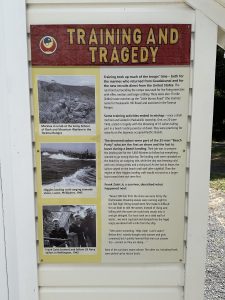
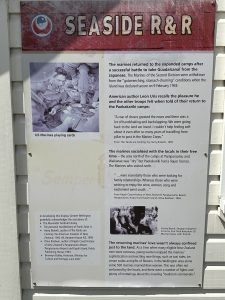



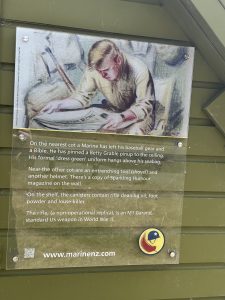
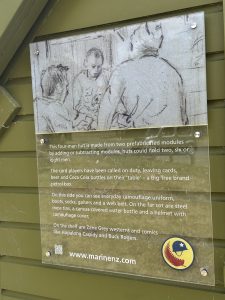




Camp Russell
During World War II the 1st and 2nd Divisions of the United States Marine Corps camped in this area from June 1942 to October 1943.
The 2nd Infantry Regiment was based here at Camp Russell, the 6th Infantry at Camp MacKay across the highway on Whareroa Farm and the 8th Infantry at the northern end of Paekakariki.
The Marines fought at Guadalcanal in 1912, the 2nd Division returning to Paekakariki for rest and recovery during the winter of 1943. Departing again in November 1943, the 2nd Division saw action on Taiawa Atoll, Saipan, Tinian Island and Okinawa, eventually landing at Nagasaki in September 1945 as part of the allied occupation forces. The Divisions casualties during the Pacific campaign were 2,795 killed and 9,600 wounded.
The Wellington Regional Council in association with the Kapiti Coast District Council erected these interpretative displays in the form of a re-recreated camp in June 1992 to mark the 50th Anniversary return visit of servicemen from the United States of America.
Clicks and Consequences: Navigating the Impact of Social Media on Politics
The impact of social media on politics has been profound and far-reaching. With the rise of platforms such as Twitter, Facebook, and Instagram, politicians have gained a new and powerful tool to reach and engage with their constituents. Social media has revolutionized political campaigns, allowing politicians to connect directly with voters, share their opinions, and mobilize support. It has also provided a platform for citizens to voice their concerns, share their political views, and participate in political discussions. The widespread use of social media has democratized the political landscape, enabling individuals from all walks of life to have a voice in shaping public opinion and influencing political decisions. However, the impact of social media on politics is not without its challenges and risks. The spread of fake news and misinformation has become a major concern, as social media platforms have been exploited to manipulate public opinion and sway elections. The echo chamber effect, where individuals are surrounded by like-minded people who reinforce their existing beliefs, has also been amplified by social media algorithms, leading to polarization and a lack of constructive dialogue. Furthermore, the sheer volume of information available on social media can make it difficult for voters to distinguish between reliable sources and biased or inaccurate content. Despite these challenges, social media remains a powerful tool for political engagement and has the potential to foster transparency, accountability, and civic participation. It is up to policymakers, social media platforms, and users themselves to navigate these challenges and ensure that social media continues to have a positive impact on politics.



